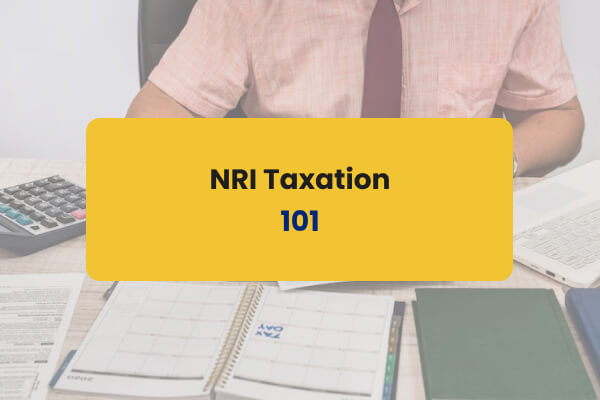Series: NRI Taxation 101
Article: 02
In the last article we discussed about few basic concepts on NRI taxation in India. In case you haven’t read that yet. We recommend you to read Article 01 first, then read this article.
In this article, we discuss below topics
Table of Contents
1. What are “deductions” in Income Tax Act?
2. Deductions Allowed for NRIs
3. Deductions not allowed for NRIs
4. Basics of Double Taxation
1. What are deductions in Income Tax Act?
Deductions provisions in the Income Tax Act are powerful tools to reduce your tax liability. Income Tax Act allows deductions from your total income for certain investments & expenses made by you during the financial year.
Tax will be computed on net total income arrived after deducting allowed deductions from your gross total income.
Example
Gross Total Income – Rs. 1,00,00,000
Total Deductions Allowed – Rs. 1000000
Net Total Income – Rs. 9500000
Tax will be computed on Rs.9500000 as per applicable tax slab rates.
Now, you understand the concept of deduction, let’s understand more on deductions available and not available for NRIs.
2. Deductions allowed for NRI
Section 80C: Maximum deduction of Rs.1,50,000/- is allowed from gross total income under section 80c for below payments made.
1. Life insurance premium payment (Self, Spouse, Children)-Premium must be less than 10% of the sum insured.
2. Children’s tuition fee payment to any school, college, university, or educational institution situated within India for full-time education of any two children.
3.Principal repayment on Loan to purchase house property.
4.Unit-linked insurance plans.
Section 80D: NRIs are allowed to claim a deduction against payments made for health insurance premiums. This deduction is available as follows
For self, spouse, dependent children – Up to Rs.25000/-
For Parents- Up to Rs.25000/-
Within the above limits, a deduction up to Rs.5000/- incurred on preventive health checkups is also available.
Section 80E: Interest paid on educational loan taken for the higher education of Self, Spouse, Children can be claimed as deduction. There is no limit on the amount of deduction under this section.
Section 80G: NRIs are eligible to claim deductions for donations made during the previous year.
Section 80TTA: Maximum deduction allowed under this section on income from interest on saving bank account (not time deposits) is Rs.10000/-
3. Deductions not allowed to NRIs
The following are some of the investments against which deduction under section 80C is not allowed to NRIs.
- Investment in PPF, Investment in National Saving Certificates, Post office5-Year deposit scheme, Senior citizen savings scheme.
Deduction for differently-abled under section 80DD, section 80DDB, and 80U are not available to Non-resident Indian.
Above deductions are normally available to Resident Indians but are not available to Non-Resident Indians.
4. Basics of Double Taxation
Double taxation means taxing the same income twice in the hands of an assesse.
Where a taxpayer is resident in one country but has a source of income from another country it gives rise to possible double taxation.
A particular income may be taxed in India based on residence rule and the same income may be taxed in another country based on source rule as per the laws of that particular country. This gives rise to double taxation.
Too technical right, let’s understand this with an example. Let’s assume Mr.A is an NRI residing in USA earning salary income of Rs. 30 lakhs in USA and have Rs. 20 lakshs rental income in India.
Assuming Rs. Currency and flat tax rate of 30% for simplicity, tax calculation in both countries would be as below.
Tax computation in USA
Salary Income from USA: Rs. 30 lakhs
Rental Income from India: Rs. 20 lakhs
Total Income: 50 lakhs
Tax @ 30%: 15 lakhs
Since, you are resident in USA, as per USA Income Tax laws, global income will become taxable in USA and you have to pay tax on entire income including income earned in India.
Tax Computation in India:
Since you are NRI, income earned / received in India alone will be taxable in India. Refer Article 01 for better clarity.
Rental Income from India: 20 Lakhs
Salary Income from USA: Rs.0 (Not considered as Income since you are an NRI.)
Total Income: Rs. 20 Lakhs
Tax payable in India @ 30%: 6 lakhs
To both countries, you pay a total of 21 lakhs. Income earned in Indian (20 lakhs) got taxed in India and also USA. This is called double taxation. This is not fair to tax payer. So, most of countries include double taxation avoidance related provisions in their Income tax act/laws.
Likewise, In order to take care of such situations, Indian Income Tax Act, 1961 has provided for double taxation relief. By using this provisions, you can get a credit for tax paid in India from US government. Continuing above example. Tax you pay to USA government will be 9 lakhs (15 lakhs – 6 lakhs)
This relief is usually provided in two methods as explained below

Bilateral relief again can be granted in either of the following two methods.

One important thing you should note is that this process is not automatic. There are various compliances that needs to be done before you can avail this credit such as filing return in both countries, applying for a credit in Resident country with the proof that you paid tax in other country and many other compliance requirements.
You should also note that, many countries have provisions to deduct TDS that means you pay tax when you receive that particular income itself. Hence, it becomes very important to apply for refund of TDS deducted if your income is double taxed.
Double taxation is a very complex topic and have varying compliance requirements from country to country. A method to get double tax relief from USA can be entirely different from method to get the same relief from UK. So, it is super important that your chartered accountants have expertise in income tax laws of India as well as Income tax laws of country you reside.
We believe this article helped you understand very basics of NRI taxation especially double taxation. In next article, we discuss double taxation in detail and how you can benefit from DTAA and double taxation avoidance provisions.
Author

Sanjana C
I am an expertise in Chartered Accountant with a focus on taxation. Also mastered the intricacies of global tax laws and enjoys studying foreign languages in spare time.

 Expert verified
Expert verified 

